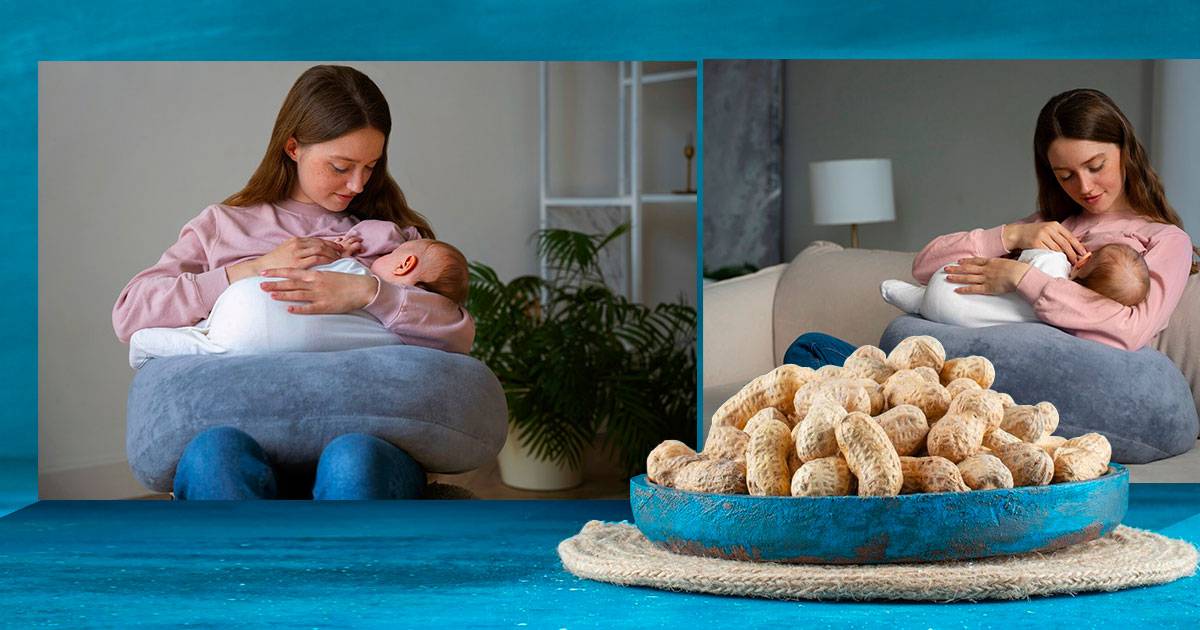How can eating peanuts while breastfeeding affect children?

Recent studies indicate that eating peanuts during pregnancy or while breastfeeding won’t cause peanut allergies in your baby; it might even guard against it. However, if a mother has a family history of allergies, she may be advised to follow specific guidelines to lessen the likelihood and severity of allergic symptoms in her baby.
Does peanut transfer to breast milk?
Peanut protein can transfer to breast milk within 10 minutes of eating just one ounce (30 grams) of peanut protein. The level in breast milk peaks after one hour but can still be found for up to 24 hours. A study with mice found that certain immune complexes (IgA and IgG) related to peanut allergens are also secreted in breast milk, which helped develop partial oral tolerance. It’s not advised to avoid peanuts while breastfeeding because it doesn’t prevent peanut allergies.
Eating Peanuts while Breastfeeding
Before, people believed that avoiding peanuts during pregnancy was the best way to prevent peanut allergies. But it turns out that this doesn’t actually reduce peanut allergies. A study involving 8059 pregnant mothers who weren’t allergic to peanuts found that those who ate peanuts more than five times a month had babies with significantly fewer peanut allergies compared to those who ate peanuts less than once a month.
If you’re not allergic to peanuts, it’s okay to eat them while breastfeeding. There’s no proof that avoiding peanuts will benefit you or your baby. However, if you’re anxious about it or worried about your baby developing a food allergy, it’s best to talk to your doctor for guidance and reassurance. They can provide you with personalized advice based on your situation and ease any concerns you may have about eating peanuts while breastfeeding.
Introduction of Peanuts
In 2000, the American Academy of Pediatrics (AAP) gave advice to prevent food allergies in high-risk babies. They suggested delaying introducing peanuts until age three if there was a history of allergic symptoms or family members with allergies. But over the next ten years, allergies increased. So, in January 2008, the AAP reviewed their advice and found no solid evidence to support delaying allergenic foods. Other groups, like the European Society for Pediatric Gastroenterology, Hematology, and the Nutrition Committee, agreed with this update.
In 2015, a study called the LEAP study was done in the UK. They gave small amounts of peanut products three times a week to babies at high risk for allergies. It showed that starting peanuts between four and 11 months of age reduced peanut allergy risk by 80%. Another study, EAT, gave multiple allergens to breastfed babies at three months old. They found no peanut allergies in the 310 babies who had peanuts early, but 13 cases in the 525 babies who tried peanuts later. The amounts of solid food given in these studies are very small, more like tastes or therapy than big meals.
Best Practice
The 1994 Canadian Asthma Primary Prevention Study (CAPPS) supported breastfeeding to prevent peanut allergy. It found that the biggest drop in peanut allergy happened when breastfeeding moms ate peanuts and introduced peanut products to their babies before they turned one. This may help the baby’s immune system get used to peanuts later on. While there’s some proof for early peanut introduction, there’s not enough evidence for introducing other foods early. More research on other allergens is happening to help breastfeeding moms in the future.
Breastfeeding and Allergies
Breastfeeding is crucial for both mothers and babies. Although it won’t entirely prevent allergic diseases in infants, exclusively breastfeeding for the first six months and continuing to breastfeed for at least a year can help postpone the onset of allergic symptoms like gas, diarrhea, vomiting, fussiness, and skin rashes, as well as lessen their severity.
Parents of babies with a risk of peanut allergy have been advised against starting solid foods too early. But recent studies show that waiting too long, beyond six months, to introduce foods other than breast milk may raise the risk of allergic disease. It seems that exposing the immune system to foreign proteins (antigens) at a certain time, neither too early nor too late, might lead to tolerance rather than sensitivity to those antigens.
How to Possibly Reduce the Risk of Peanut Allergy in Babies
To lower the risk of peanut allergy in children, experts suggest:
- If your baby doesn’t have any known risk of peanut allergy (like no eczema or diagnosed food allergy) or only has mild-to-moderate eczema, you can chat with their doctor about giving them peanut foods when they’re around 6 months old.
- If your baby has risk factors like severe eczema or an egg allergy, the doctor might suggest a skin-prick test before giving them peanut foods. Babies who don’t react can start having peanuts in small amounts. Those with a mild reaction might try a “food challenge,” where a doctor gives a small amount of peanut-containing food and watches closely for any reaction. Babies who don’t react can start eating peanut-containing foods.
Since our knowledge about allergies is always evolving, moms of babies at high risk (especially those with eczema, skin issues, or egg allergies) should speak with their baby’s doctor before giving them anything other than breast milk.
Reducing Peanut Allergy in Children
If you’re a parent or soon-to-be parent, remember: breastfeeding is vital for your baby’s health, and introducing peanuts early could help prevent allergies later on. Don’t worry about eating peanuts while breastfeeding, as it won’t harm your baby. If you’re unsure, talk to your doctor for personalized advice. And remember, if your baby is at risk of a peanut allergy, consult their doctor before introducing solid foods. Let’s work together to keep our little ones healthy and happy.
